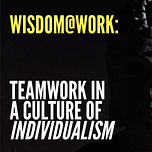In the midst of a digital book tour last year for Team Habits, I appeared on David Storey’s podcast Wisdom @ Work. This pod explores the value of philosophy in everyday life and in particular, in the workplace. Our conversation touched on several interesting points, from the workplace experience post-pandemic to the importance of teams in a culture of individualism.
Since 80% of the time we spend is with the four to eight people we work with on a day-by-day basis, our team dynamics are a place of hidden power and potential. Team Habits is in part about the ways we can undo unnecessary workplace anxiety about our individual performance and how we’re perceived (which actually get in the way of team performance) — to instead see higher levels of success, in our careers and in our teams.
I appreciate your giving my conversation with David a listen. For insight on more specific points of the conversation, check out the timestamps below. 👇
Topics We Explored
The importance of teams in achieving workplace productivity.
Building strong teams through psychological safety, belonging, and everyday interactions.
Challenges of managing teams during crises, and the need for a growth mindset, team habits, and small improvements.
How to recognize and navigate power dynamics within teams.
Taking responsibility for choices in team habits, and managing team habits in remote or hybrid environments.
Personal experiences with significant transitions and the importance of self-awareness, resilience, and adaptability in navigating these changes.
Episode Timestamps
[0:00] Why Team Habits count, and how Charlie came to writing about team effectiveness.
Charlie argues that teams, not individuals, are key to success in business and personal flourishing. His experiences in the Army and philosophy inform his unique perspective on productivity and flourishing, while his work combines practical and theoretical approaches to help individuals and organizations achieve their goals.
[4:43] The impact of the COVID-19 pandemic on team operations.
The pandemic has deeply influenced how teams operate, for better or worse, disrupting existing work routines and habits, and forcing teams to adapt and find new ways to work together.
[12:04] Why we should shift the focus to team vs. individual performance.
Teams are the basic unit of most companies, organizations and businesses’ structure. That makes teams also the primary source of value in organizations, because whether in small startups or larger organizations, building effective teams is crucial for success. Often people's attention is misguided at work due to a lack of coordination within the team.
[16:49] Power dynamics in teams, focusing on interpersonal power.
Charlie highlights interpersonal power and how it comes into dynamics in the workplace. Teammates need to work together to solve problems instead of blaming a single individual. Personal responsibility is essential to a successful team dynamic, rather than relying on institutional power structures. Challenges can arise with addressing problems within a team, particularly when individuals are reluctant to take ownership and engage in open communication.
[23:41] Team habits and their impact on workplace anxiety.
Individuals are constantly choosing and reinforcing team habits. There is no neutrality. Charlie highlights common team habits that can cause problems, such as not confirming tasks or lacking a clear plan. Addressing these issues by simply acknowledging is a path to changing them, rather than overcomplicating solutions.
[32:07]Why belonging is hard to cultivate in workplaces, with references to social science research and individualistic culture.
So many people experience “death by 1000 cuts” due to work-related anxiety, lack of trust, and unclear priorities. The solution is to show up with and alongside a team, doing agreed-upon work, with support and accountability from team members. Cultivating belonging can be difficult though in workplaces immersed in our individualistic culture.
[33:58] Individualism and competition in work culture, and how it affects productivity
In general, U.S. work culture is individualistic and competitive, with a focus on individual success rather than collaboration and teamwork. The dominant narrative of individual success can lead to a lack of systems thinking and a focus on individual achievement rather than collective progress.
[39:07] Avoiding excuses and improving teamwork through small, practical changes.
Small, practical ways to improve team meetings could include simple, low-cost changes, like reducing the number of meetings your team is coping with. Charlie emphasizes the importance of capturing next actions from meetings and making it a team habit. Too often we avoid making changes by blaming external factors or seeking grand solutions, rather than taking small steps towards improvement. We make work better through teamwork and micro moments, a little bit each day.
[44:36] Team habits and goal-setting for productivity and motivation.
Charlie discusses the challenges of building and leading a team, drawing on his experience in the army and as an entrepreneur, citing Epictetus and Alfred North Whitehead. Team building and goal setting are real challenges. That’s why at Productive Flourishing and Better Team Habits there’s a focus on quarterly momentum to achieve strategic goals. (This head on addresses the issue of drifting in work, which often leads to setbacks).
[50:47] Work-life balance and productivity during COVID-19 pandemic.
Charlie reflects on his shift from the Army to blogging and coaching, citing 2007 as a pivotal year in his life, when he investigated a soldier's anonymous blog that undermined a commander, which marked the beginning of his interest in blogging and its potential for sharing ideas and making money. He’s been consistently interested in projects in the "messy middle" meaning those that are struggling with limited time, energy, and attention.
[57:01] Career path and writing, with a focus on accidental and organic growth.
Charlie’s PhD was not designed with a specific career goal in mind, but he became an executive coach and business coach accidentally when enough people were asking him to do it.
[1:00:33] Balancing productivity and flourishing in a toxic productivity culture.
Charlie initially wrote about productivity and flourishing for personal interest, but readers' requests led to coaching and speaking engagements. Entrepreneurs and companies sought Charlie's expertise after reading his blog, leading to workshops and paid consulting opportunities. Charlie discusses the tension between productivity culture and flourishing, and how to balance the two.
[1:05:41] Prioritizing important tasks over urgent ones to achieve progress.
Charlie critiques hustle culture, suggests aligning work with true priorities. In an organization setting with too many meetings, individuals may find themselves caught in a cycle of explaining their work instead of actually doing it, leading to frustration and inefficiency. The focus should be on progress, not amount of effort exerted. Avoid creating a false sense of urgency for your team.
[1:11:06] Managing fear and decision-making in business.
Charlie mentions the “van down by the river fallacy,” where individuals fear one mistake will lead to catastrophic consequences. He encourages listeners to think critically about this fallacy and consider how to scope failures as learning points. Experience in the military gives him a sense of perspective in dealing with crises in the business world.
[1:16:40] Team habits and virtual work challenges.
If you build relationships and trust with team members you can make better decisions and overcome challenges. It’s important to also understand and address your team’s struggles outside of work, as they inevitably have an impact on an individual's performance and well-being at work. If a team member is struggling with personal issues outside of work, the right play is offering support and understanding, rather than taking work away or shutting down lines of communication.
[1:21:59] Managing team habits in virtual and hybrid work environments.
Charlie discusses the importance of explicit communication (given lack of nonverbal cues in virtual settings) in hybrid teams. Consider setting team agreements around availability and collaboration times. It’s possible to use a variety of different technologies to show availability and create a reasonable understanding among teammates during collaborative hot zones.











🎧Wisdom@Work: Teamwork in a Culture of Individualism🎧